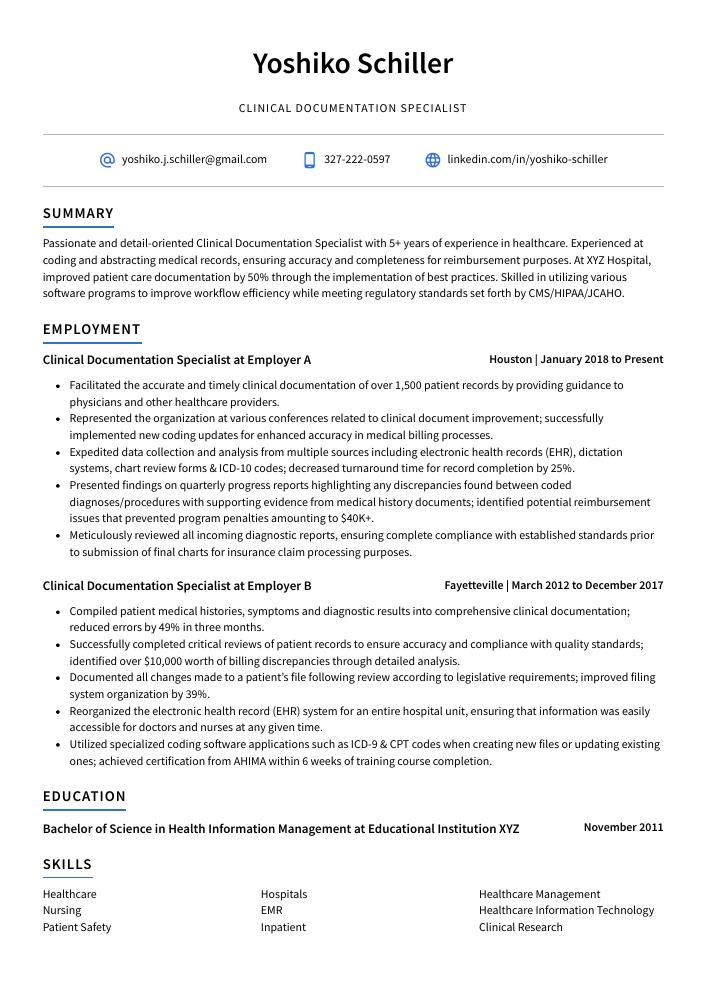Clinical Documentation Specialist Resume Guide
Clinical Documentation Specialists are responsible for maintaining accurate and complete medical records in the hospital setting. They review clinical documentation to ensure accuracy, completeness, and compliance with regulatory requirements related to billing and coding. Additionally, they provide education on documentation improvement strategies for physicians, nurses, coders and other healthcare professionals.
You know how to organize and record medical data like no one else. But potential employers won’t be aware of your capabilities until you write a resume that highlights your skills and accomplishments as a clinical documentation specialist.
This guide will walk you through the entire process of creating a top-notch resume. We first show you a complete example and then break down what each resume section should look like.
Table of Contents
The guide is divided into sections for your convenience. You can read it from beginning to end or use the table of contents below to jump to a specific part.
Clinical Documentation Specialist Resume Sample
Felicia Johnson
Clinical Documentation Specialist
[email protected]
482-288-9713
linkedin.com/in/felicia-johnson
Summary
Passionate and detail-oriented Clinical Documentation Specialist with 5+ years of experience in healthcare. Experienced at coding and abstracting medical records, ensuring accuracy and completeness for reimbursement purposes. At XYZ Hospital, improved patient care documentation by 50% through the implementation of best practices. Skilled in utilizing various software programs to improve workflow efficiency while meeting regulatory standards set forth by CMS/HIPAA/JCAHO.
Experience
Clinical Documentation Specialist, Employer A
Tampa, Jan 2018 – Present
- Facilitated the accurate and timely clinical documentation of over 1,500 patient records by providing guidance to physicians and other healthcare providers.
- Represented the organization at various conferences related to clinical document improvement; successfully implemented new coding updates for enhanced accuracy in medical billing processes.
- Expedited data collection and analysis from multiple sources including electronic health records (EHR), dictation systems, chart review forms & ICD-10 codes; decreased turnaround time for record completion by 25%.
- Presented findings on quarterly progress reports highlighting any discrepancies found between coded diagnoses/procedures with supporting evidence from medical history documents; identified potential reimbursement issues that prevented program penalties amounting to $40K+.
- Meticulously reviewed all incoming diagnostic reports, ensuring complete compliance with established standards prior to submission of final charts for insurance claim processing purposes.
Clinical Documentation Specialist, Employer B
Yonkers, Mar 2012 – Dec 2017
- Compiled patient medical histories, symptoms and diagnostic results into comprehensive clinical documentation; reduced errors by 49% in three months.
- Successfully completed critical reviews of patient records to ensure accuracy and compliance with quality standards; identified over $10,000 worth of billing discrepancies through detailed analysis.
- Documented all changes made to a patient’s file following review according to legislative requirements; improved filing system organization by 39%.
- Reorganized the electronic health record (EHR) system for an entire hospital unit, ensuring that information was easily accessible for doctors and nurses at any given time.
- Utilized specialized coding software applications such as ICD-9 & CPT codes when creating new files or updating existing ones; achieved certification from AHIMA within 6 weeks of training course completion.
Skills
- Healthcare
- Hospitals
- Healthcare Management
- Nursing
- EMR
- Healthcare Information Technology
- Patient Safety
- Inpatient
- Clinical Research
Education
Bachelor of Science in Health Information Management
Educational Institution XYZ
Nov 2011
Certifications
Certified Clinical Documentation Specialist (CCDS)
American Health Information Management
May 2017
1. Summary / Objective
Your resume summary should be a concise overview of your qualifications as a clinical documentation specialist. Highlight any relevant certifications or training you have, such as ICD-10 coding and medical terminology courses. You can also mention the number of years you’ve been in this field, how many patient records you’ve processed, and any awards or recognition received for excellence in documentation accuracy.
Below are some resume summary examples:
Proficient clinical documentation specialist with experience in a variety of medical settings. Skilled at accurately and efficiently transferring data from patient charts into the correct electronic health record (EHR) system. Utilizes excellent knowledge of healthcare regulations to ensure compliance when managing clinical documents. Successfully increased accuracy rate for charting by 10% at XYZ Hospital, resulting in improved overall quality ratings.
Committed and detail-oriented clinical documentation specialist with 5+ years of experience in healthcare. Skilled at quickly deciphering complex medical terminology and accurately translating into patient records for review by doctors, nurses, and insurance providers. Proven track record of maintaining HIPAA compliance while improving document accuracy rates from 76% to 95%. Seeking an opportunity to utilize my expertise at ABC Medical Center.
Skilled Clinical Documentation Specialist with 7+ years of experience in healthcare settings. Displays a strong understanding of EHR systems, ICD-10 coding and medical terminology. Proven track record of improving processes that increase accuracy, efficiency and patient satisfaction. Seeking to join ABC Hospital as the next Clinical Documentation Specialist where my skills can be used to ensure accurate documentation for all patients.
Talented clinical documentation specialist with 5+ years of experience in healthcare. Experience includes analyzing and abstracting medical records to ensure accuracy, completeness, and compliance with applicable regulations. At XYZ Hospital I improved turnaround times by 30% while reducing errors by 40%. Skilled at training new staff on proper documentation processes and developing efficient workflows for improving efficiency.
Determined clinical documentation specialist with 7+ years of experience in the healthcare sector. Skilled at utilizing ICD-10 and CPT coding systems to ensure accuracy in medical records. Successfully implemented an automated system for more efficient processing of patient information, resulting in a 15% decrease in paperwork errors. Seeking to bring this expertise to ABC Health as part of their clinical documentation team.
Diligent clinical documentation specialist with 7+ years of experience in healthcare IT. Specializes in creating, editing, and validating patient medical records to ensure accuracy and compliance with HIPAA regulations. At XYZ hospital, led the implementation of an EHR system that reduced manual errors by 60%. Received multiple awards for exemplary service from clients across various organizations.
Amicable and detail-oriented clinical documentation specialist with 8+ years of experience in medical record review and analysis, patient care coordination and coding. At ABC Medical Centre, achieved a 95% accuracy rate for code assignment. Seeking to join XYZ Hospital as the next Clinical Documentation Specialist to provide high quality healthcare services while maintaining compliance standards.
Accomplished Clinical Documentation Specialist with 5+ years of experience in medical coding, documentation improvement, and quality assurance. Possess a deep understanding of ICD-10 and CPT codes for accurate diagnosis reporting. At XYZ Hospital successfully implemented hospital wide electronic health records system which improved patient care delivery by 50%.
2. Experience / Employment
The employment (or experience) section is where you talk about your work history. This should be written in reverse chronological order, meaning the most recent job comes first.
When writing this section, stick to bullet points primarily; doing so makes it easier for the reader to take in what you have to say quickly and efficiently. When crafting each point, provide detail on what you did and any results obtained from your actions.
For example, instead of saying “Reviewed patient records,” you could say “Reviewed over 200+ patient records per day for accuracy and completeness while ensuring compliance with HIPAA regulations.”
To write effective bullet points, begin with a strong verb or adverb. Industry specific verbs to use are:
- Documented
- Assessed
- Analyzed
- Monitored
- Coded
- Reviewed
- Compiled
- Processed
- Researched
- Updated
- Coordinated
- Interpreted
- Assisted
- Evaluated
Other general verbs you can use are:
- Achieved
- Advised
- Demonstrated
- Developed
- Expedited
- Facilitated
- Formulated
- Improved
- Introduced
- Mentored
- Optimized
- Participated
- Prepared
- Presented
- Reduced
- Reorganized
- Represented
- Revised
- Spearheaded
- Streamlined
- Structured
- Utilized
Below are some example bullet points:
- Mentored and trained 5 new clinical documentation specialists on coding, diagnosis and procedure validation requirements; reduced errors in medical records by 25%.
- Efficiently reviewed an average of 100+ patient charts per day for accuracy, completeness and compliance with regulatory guidelines while meeting established deadlines.
- Analyzed clinical data to identify potential inaccuracies or inconsistencies in documentation; successfully resolved 98% of discrepancies reported by healthcare providers within 24 hours.
- Streamlined processes used to audit patient files for quality assurance purposes, decreasing review time from 3 days to 1 day without compromising document integrity or accuracy levels.
- Reduced hospital readmissions rates related to incorrect coding issues by 10% through the implementation of a more efficient chart-auditing system utilizing specialized software programs.
- Prepared and reviewed 200+ clinical documentation for accuracy and compliance with the standards of care in a timely manner, enabling efficient billing practices that increased revenue by $4,000.
- Spearheaded implementation of new processes to streamline review times; reduced average turnaround time by 25%.
- Improved communication between departments through effective collaboration with nurses, physicians and other clinicians to ensure accurate representation of patient data in medical records.
- Demonstrated strong technical abilities while utilizing advanced software programs such as Epic EHRs and Cerner Millenium to maintain up-to-date electronic health records (EHR) systems for over 1,500 patients per month without error or omission.
- Consistently met all deadlines related to preparing/reviewing high volumes of clinical documents within established timelines while maintaining strict confidentiality at all times.
- Evaluated and revised 350+ medical records for completeness and accuracy, leading to a 17% improvement in the overall documentation quality.
- Achieved 95% patient confidentiality compliance rate by ensuring that PHI was kept secure at all times; decreased data breach incidents by 25%.
- Monitored physician coding activities to ensure accurate clinical documentations were completed on time with 97% effectiveness; improved turnaround time from 13 days to 8 days per case.
- Developed an electronic health record system tailored specifically for the organization’s needs, resulting in increased efficiency of information sharing among healthcare providers.
- Competently handled complex queries related to insurance companies and other third parties while providing necessary support during their audits with 100% accuracy adherence rate within deadlines set forth.
- Confidently revised and updated medical records of 500+ patients daily, ensuring accuracy and completeness in accordance with all HIPAA regulations.
- Processed over 1,000 clinical documents per week; made critical updates to existing documentation as needed to ensure clarity and compliance with federal guidelines.
- Coordinated frequently with healthcare providers on patient care information along with physicians’ orders for treatment modifications or changes when necessary.
- Assisted the nursing staff by providing support throughout their shift including preparing patient charts prior to admissions & discharges from the hospital unit each day.
- Reduced backlog of pending documentations by 30% within 3 months through excellent prioritization skills & efficient workflow management techniques utilized during review processes.
- Advised over 200 medical professionals on all aspects of clinical documentation and coding, resulting in a 30% decrease in errors.
- Researched complex health records to ensure accuracy and completeness; detected over $1 million worth of discrepancies within the first 6 months of employment.
- Interpreted physician notes, lab results & diagnostic reports accurately while ensuring compliance with HIPAA regulations; decreased time spent per document by 20%.
- Diligently reviewed patient charts for any missing information or incorrect codes prior to final submission, leading to an increase in revenue collection by 10%.
- Updated electronic systems daily with new patient data such as diagnosis codes & treatments provided for accurate billing processes that resulted in 90% fewer claims being denied reimbursement from insurers/payers.
- Reliably documented patient data in electronic health records (EHRs) and paper charts, ensuring accuracy and completeness of over 500 medical reports per month.
- Structured clinical documentation to meet payer requirements while adhering to departmental policies; increased reimbursement rates by 10% on average within the first 6 months of employment.
- Formulated comprehensive discharge summaries for 50+ patients weekly based on complex laboratory results & doctor notes, resulting in improved care coordination between healthcare providers & reduced readmission instances by 20%.
- Introduced novel coding methods that facilitated faster encoding turnaround times from 16 hours down to 8 hours; saved up to $10K in operational costs during a 3-month period without compromising overall quality assurance standards or workflow efficiency levels.
- Assessed gaps in existing documentation processes and implemented proactive measures such as developing quick reference guides and providing one-on-one training sessions which led to an increase of 23% team productivity across all departments involved with EHR management activities.
- Participated in monthly Coding Roundtables to discuss coding initiatives and collaborated with interdisciplinary teams to improve accuracy of medical records.
- Reviewed over 600 medical documents daily for completeness, accuracy, and compliance; achieved a 99%+ accurate documentation rate in the first quarter alone.
- Optimized clinical documentation by integrating ICD-10 codes into patient charts; resulted in an overall improvement in code capture rate of 10%.
- Coded more than 100 surgical reports accurately within 8 hours on average, utilizing extensive knowledge of anatomy & physiology as well as proficient use of 3M Encoder Pro software system.
- Accurately entered diagnosis data into electronic health record systems while auditing claims documents for accuracy prior to submitting them for reimbursement processing; reduced claim denials by 25%.
3. Skills
Even though two organizations are hiring for the same role, the skillset they want an ideal candidate to possess could differ significantly. For instance, one may be on the lookout for an individual with experience in Epic Systems and the other may be looking for someone with knowledge of Cerner.
Therefore, it is important to tailor your skills section according to each job you are applying for. This will help make sure that applicant tracking systems are able to recognize relevant keywords from your resume when scanning it before passing on to a human recruiter or hiring manager.
In addition, don’t forget about discussing these qualifications further by elaborating on them in other sections such as the summary or work experience area of your resume.
Below is a list of common skills & terms:
- ACLS
- Acute Care
- BLS
- Basic Life Support
- CPR Certified
- Case Management
- Cerner
- Clinical Documentation
- Clinical Research
- Critical Care
- EHR
- EMR
- Electronic Medical Record
- Epic Systems
- HIPAA
- Healthcare
- Healthcare Consulting
- Healthcare Information Technology
- Healthcare Management
- Home Care
- Hospitals
- ICU
- Informatics
- Inpatient
- Inpatient Care
- MEDITECH
- Managed Care
- Medicaid
- Medical Coding
- Medical Records
- Medical Surgical
- Medical Terminology
- Medicare
- Medicine
- Nursing
- Nursing Education
- Patient Advocacy
- Patient Education
- Patient Safety
- Pediatrics
- Physician Relations
- Physicians
- Quality Improvement
- Registered Nurses
- Revenue Cycle
- Surgery
- U.S. Health Insurance Portability and Accountability Act
4. Education
Mentioning your education on a resume for a clinical documentation specialist role depends on how far along you are in your career. If you just graduated and have no prior experience, include the section below your resume objective. However, if you have been working as a clinical documentation specialist for some time now with plenty of relevant work experience to showcase, omitting an education section is perfectly fine.
If including an education section, try to mention courses related to the job such as medical terminology or healthcare data management that will demonstrate knowledge and skills necessary for this type of role.
Bachelor of Science in Health Information Management
Educational Institution XYZ
Nov 2011
5. Certifications
Certifications demonstrate to a potential employer that you have the necessary knowledge and skills required for the job. It is important to include any certifications related to the position in your resume, as they can help prove that you are qualified for it.
Having certifications also shows employers that you take initiative in keeping up with industry trends and standards, which could be beneficial when competing against other applicants who lack such credentials.
Certified Clinical Documentation Specialist (CCDS)
American Health Information Management
May 2017
6. Contact Info
Your name should be the first thing a reader sees when viewing your resume, so ensure its positioning is prominent. Your phone number should be written in the most commonly used format in your country/city/state, and your email address should be professional.
You can also choose to include a link to your LinkedIn profile, personal website, or other online platforms relevant to your industry.
Finally, name your resume file appropriately to help hiring managers; for Felicia Johnson, this would be Felicia-Johnson-resume.pdf or Felicia-Johnson-resume.docx.
7. Cover Letter
Providing a cover letter along with your resume is a great way to give a potential employer more insight into who you are and why you would be an ideal candidate for the job.
Cover letters should usually consist of 2 to 4 paragraphs, introducing yourself and explaining how your skills make you a qualified applicant. They provide recruiters with more information than what can be found in your CV or resume, allowing them to get an even better understanding of who they might potentially hire.
Below is an example cover letter:
Dear Jordi,
As a clinical documentation specialist with more than 10 years of experience in the healthcare industry, I am excited to apply for the open position at your organization. In my current role, I work closely with physicians and other members of the care team to ensure that all patient documentation is complete and accurate. I have a strong understanding of medical terminology and coding systems, and I am skilled at abstracting relevant information from medical records.
I am confident that I can be an asset to your team. In addition to my experience with clinical documentation, I also have training in project management and quality improvement methodologies. I am familiar with various electronic health record (EHR) systems and have experience leading teams of clinicians in EHR implementations. My interpersonal skills are excellent, and I am able to build positive relationships with stakeholders at all levels within an organization.
I would welcome the opportunity to discuss how my skills and experiences could benefit your organization further during an interview. Thank you for your time and consideration; please do not hesitate to contact me if you have any questions about my qualifications or application materials.
Sincerely,
Felicia
Clinical Documentation Specialist Resume Templates
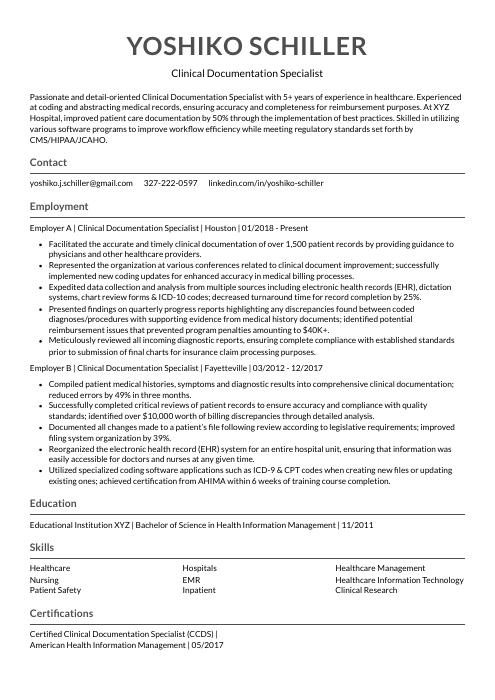 Indri
Indri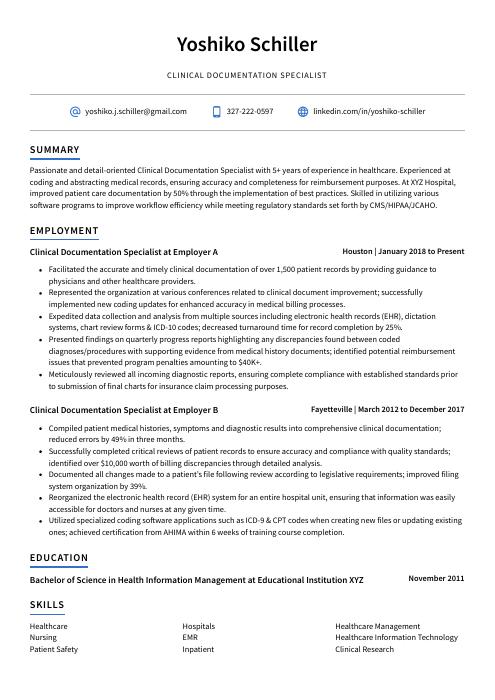 Axolotl
Axolotl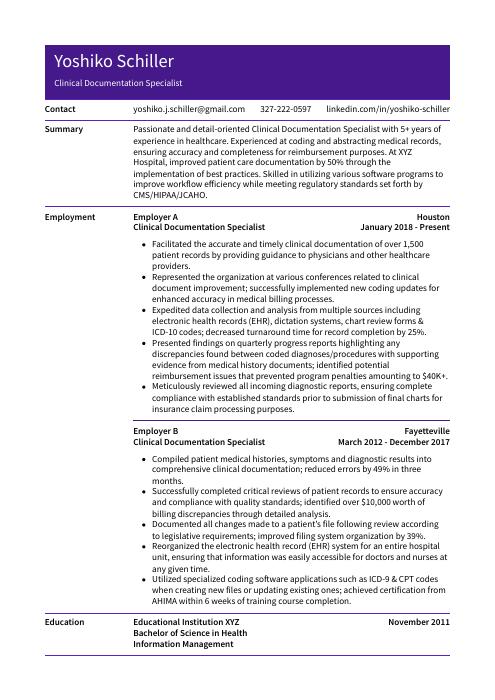 Pika
Pika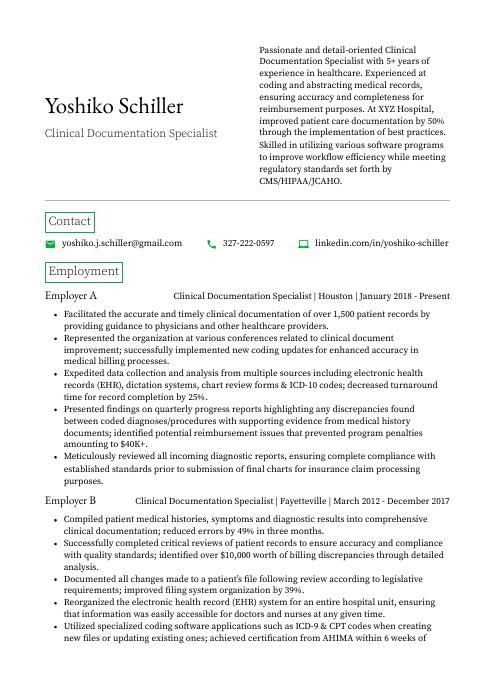 Quokka
Quokka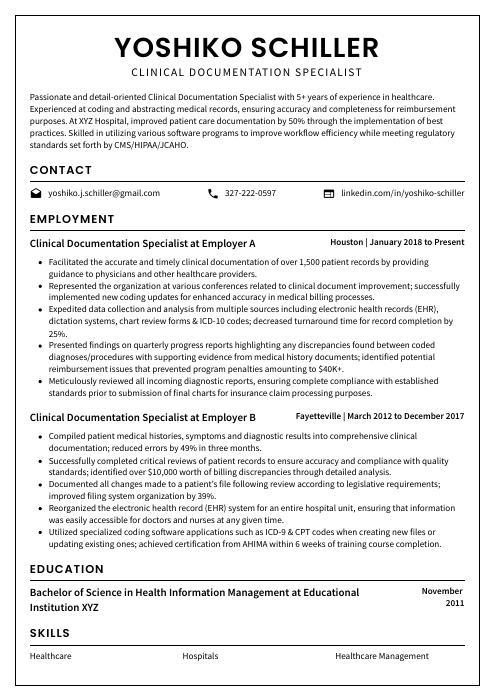 Cormorant
Cormorant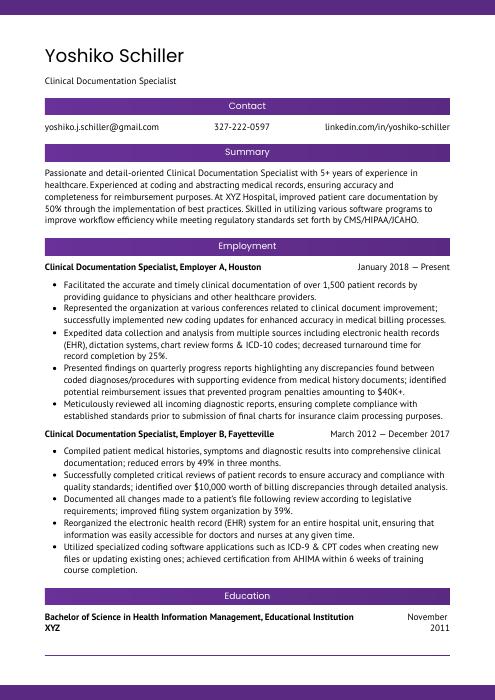 Jerboa
Jerboa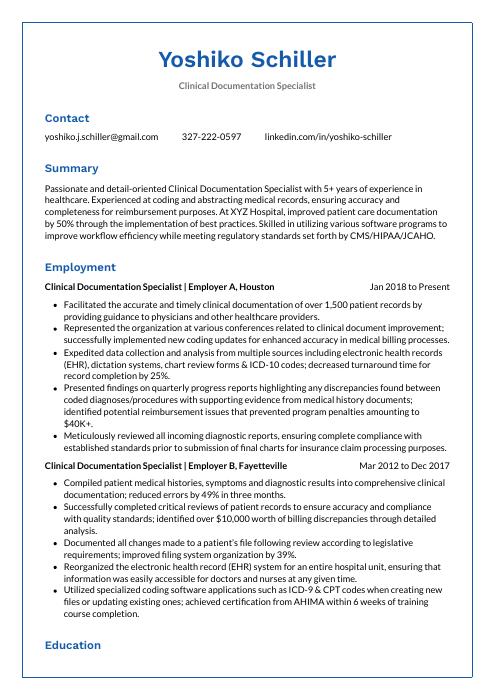 Markhor
Markhor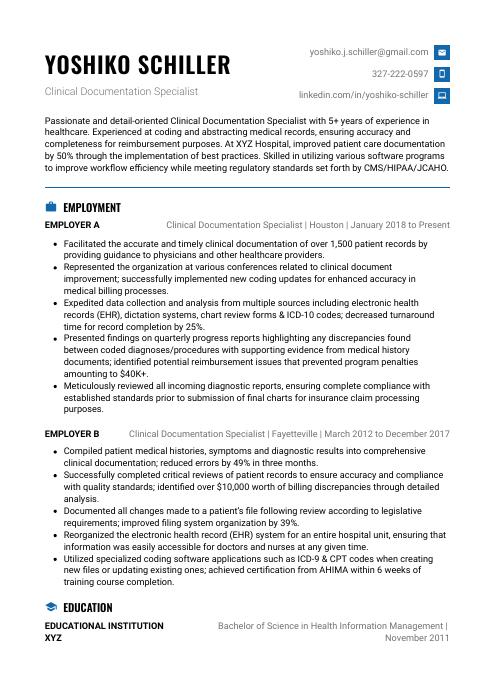 Echidna
Echidna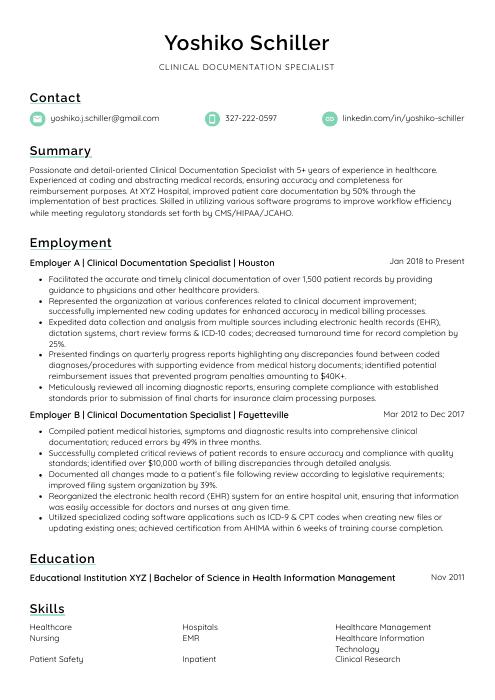 Lorikeet
Lorikeet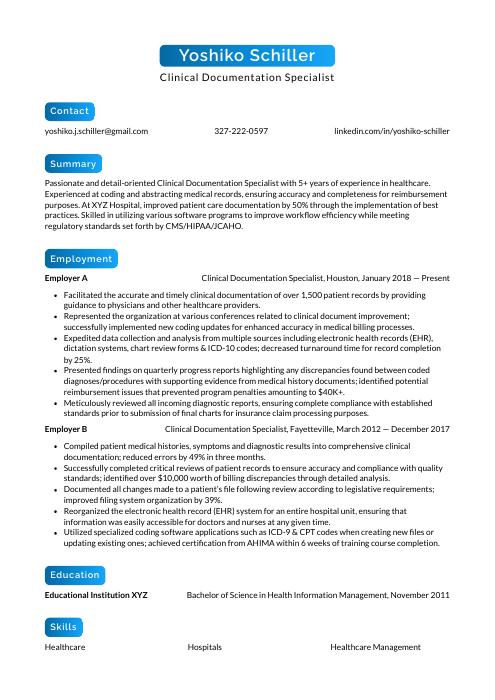 Kinkajou
Kinkajou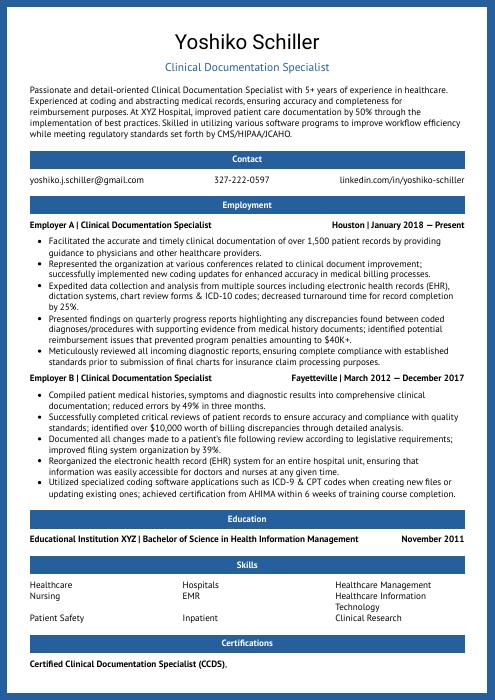 Ocelot
Ocelot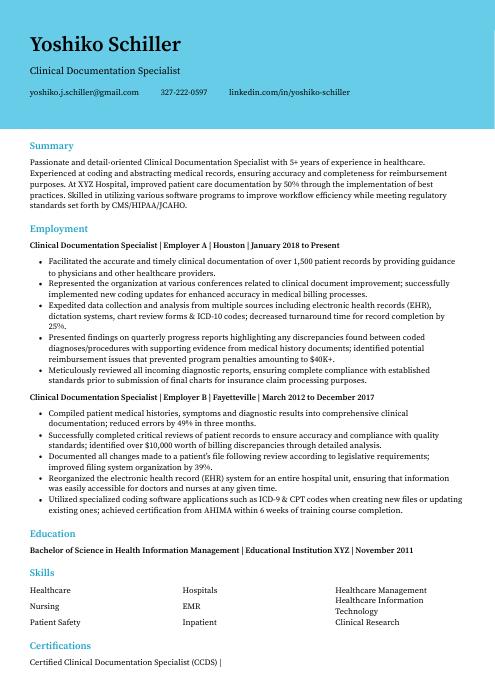 Dugong
Dugong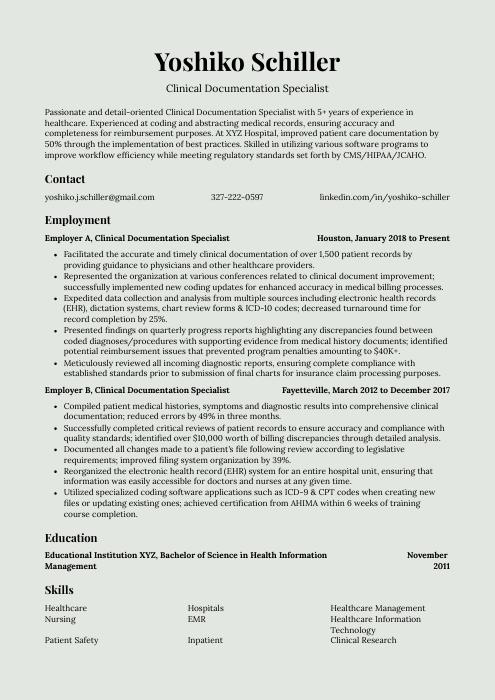 Saola
Saola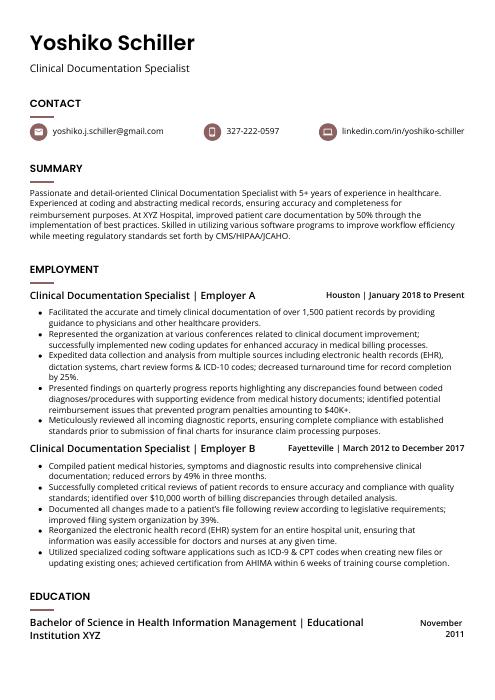 Fossa
Fossa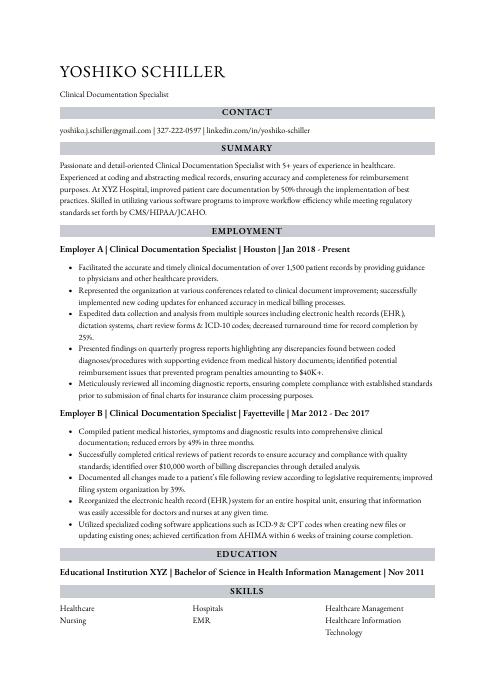 Numbat
Numbat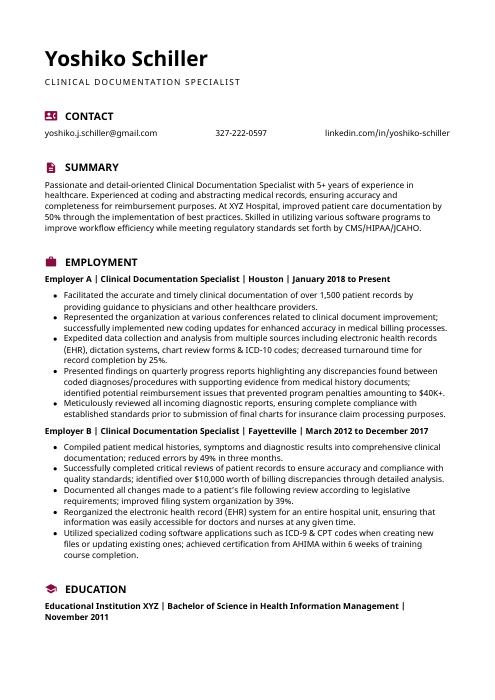 Hoopoe
Hoopoe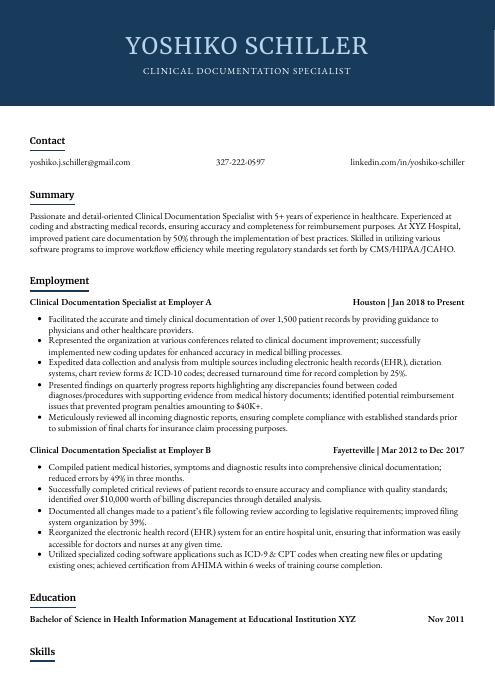 Bonobo
Bonobo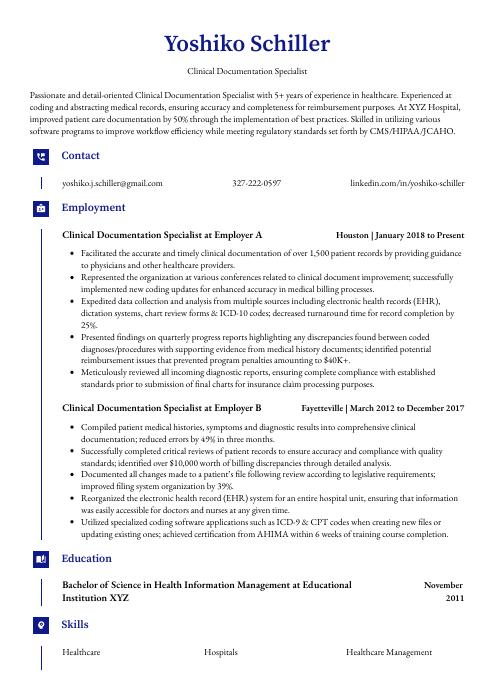 Gharial
Gharial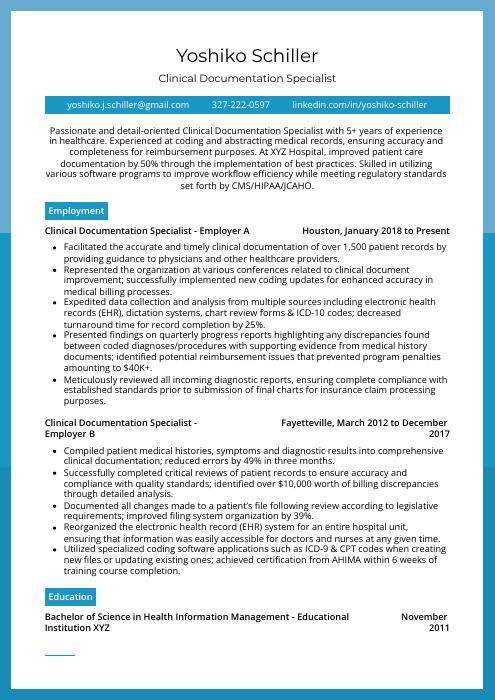 Rhea
Rhea Rezjumei
Rezjumei
